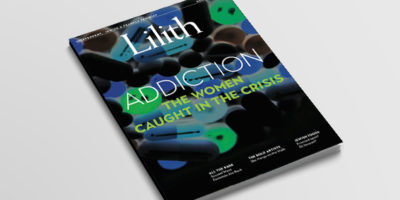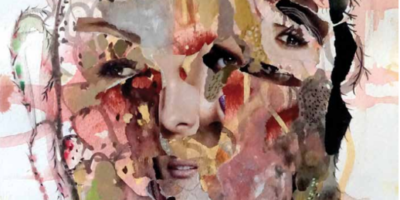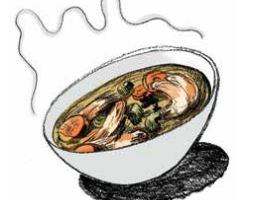Inside the World of a Pregnant Ultra-Orthodox Grandmother
On Division by Goldie Goldbloom (FSG, $26) is a novel about a 57-year-old ultra-Orthodox woman in Williamsburg, mother of 10 and grandmother of dozens, who is shocked to discover she is pregnant with twins. Surie Eckstein is embarrassed by her condition and unable to share the news with her husband. Month after month, as her secret creates more of a gulf between herself and her family, it also allows Surie to uncover her own hidden reserves of strength and vulnerability, and to cultivate a skill and sensitivity that lead her beyond the enclaves of her own insular community.
Surie Eckstein’s entire life has been defined by her family. She loves and appreciates her husband of 41 years, a scribe who raises chickens in their yard: “His work with the holy scrolls had engraved itself on his body. His shoulders were rounded, his hips ached, he had arthritis in his ink-stained fingers. He had varicosities and a belly from so many hours of sitting. But his work had marked him in positive ways too. Yidel could concentrate on a single thing for hours. He never lost his temper. His face was calm and innocent as an angel’s.” She is very close with her in-laws, Dead Onyu and Dead Opa—“dead,” we learn, is the Hungarian word for great-grandparent, though the appellation never loses its humor—who live on the ground floor. And she is deeply involved in the life of her children, including her holier-than-thou daughter Tzila Ruchel and her own many children, who live one flight down. Surie’s children, grandchildren, and in-laws constantly wander in and out of her home, and it is only rarely that she has time to sit in her favorite spot in her bedroom overlooking the East River alone with herself.
When Surie manages to find time alone, her thoughts inevitably turn to her beloved son Lipa, whom she last saw four years ago when he died of AIDS in San Francisco: “He did not have his payos. He had a tattoo on his chest and a metal ring through one nipple. Around his neck was a dark purple line that came to a V in the front, like the neckline of an undershirt, and in the gray flesh of his neck there were dozens of small cuts.” Surie remains tortured by her love for Lipa and haunted by his death. She carries his green glasses around with her everywhere, as if now, after he is lost to her forever, she might finally learn to see the world through his eyes. Lipa is the one subject she and Yidel do not speak openly about, until the pregnancy becomes another secret between them. To Surie the two secrets are bound up in one another—until she comes to terms with what happened to the child she lost, she cannot bring herself to tell her husband about the new children she is carrying.
Author Goldie Goldbloom, a Hasidic mother of eight, is not the first to expose the inner world of ultra-Orthodox Jews, but she does so with a rare sensitivity to nuance and a resistance to stereotype. Surie’s community is close-knit and suspicious of outsiders—Surie worries that her seventeen-year-old son may be hiding a forbidden “lep tup” in their basement— but she is aware of and engaged with “the outside world,” to cite the title of a Tova Mirvis novel about a similar milieu. Surie develops a close relationship with Valerie, the senior midwife in the high-risk clinic where Surie travels by bus for her check-ups (“Where are you from?” a woman on the bus asks her, eyeing her nylon wig and scarf. “You don’t look like anyone I know.”) She grows resentful of the know-it-all male doctor who cannot understand her resistance to invasive testing: “She wished a sweet death—being run over by a sugar truck—upon obstetricians who used the collective ‘we’ when they really meant ‘you.’ The doctor wasn’t pregnant… It didn’t matter what happened to her or to the babies. Their births, her own health, it was all in God’s hands. Only those without faith worried about such things. Either there would be a disaster, or there wouldn’t, and stressing oneself, worrying about it, wouldn’t change a thing.”
The midwife Valerie appreciates the culture clash between the doctors and their Williamsburg clientele, and soon she hires Surie as her assistant to counsel other ultra-Orthodox patients, including a thirteen-year-old girl who is banished from the community a er she is tragically impregnated by a trusted adult. Surie decides she wants to be a nurse—an unusual decision for any late-middle-aged woman, let alone a Hasidic grandmother expecting twins—and she borrows textbooks from the clinic that she secretly studies at home. Surie Eckstein surprises herself, but she also confounds our expectations of a character like her. The fact that she remains, throughout, a sympathetic and convincing heroine is a testament to Goldbloom’s masterful skill as a storyteller. This is a novel that moves and affects us on so many levels—as a witness to the unremitting pain of losing a child, as an exploration of the dance of intimacy and interiority in a marriage that is nearly lifelong, and as a celebration of our endless capacity to create new life, and to create new lives for ourselves.




